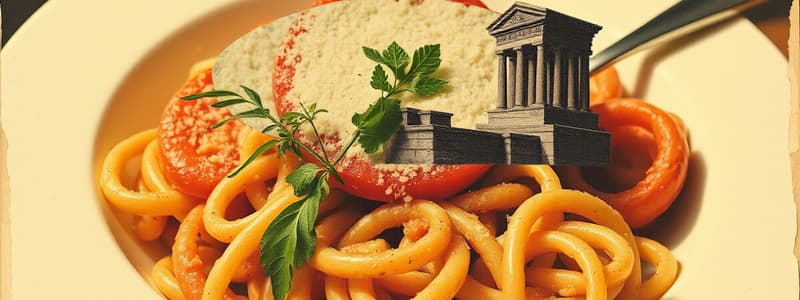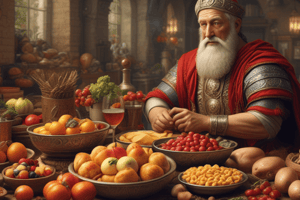Podcast
Questions and Answers
What impact did the Roman Empire have on the exchange of cooking techniques?
What impact did the Roman Empire have on the exchange of cooking techniques?
It facilitated the exchange of ingredients and cooking techniques across regions.
How does 'cucina povera' reflect the socio-economic conditions of Rome?
How does 'cucina povera' reflect the socio-economic conditions of Rome?
It refers to the tradition of using simple, inexpensive ingredients.
In what way do seasonal ingredients play a role in Roman cuisine?
In what way do seasonal ingredients play a role in Roman cuisine?
Dishes that change with the harvest showcase seasonal ingredients, like spring artichokes.
What influence did tomatoes have on Roman sauces?
What influence did tomatoes have on Roman sauces?
What is the cultural significance of street food in Roman culinary practices?
What is the cultural significance of street food in Roman culinary practices?
What is the role of olive oil in traditional Roman cooking?
What is the role of olive oil in traditional Roman cooking?
Describe a method by which modern Italian cooking has been influenced by Roman cuisine.
Describe a method by which modern Italian cooking has been influenced by Roman cuisine.
What is the significance of the dish 'cacio e pepe' in Roman cuisine?
What is the significance of the dish 'cacio e pepe' in Roman cuisine?
Flashcards are hidden until you start studying
Study Notes
Roman Cuisine Overview
- Main ingredients: Pasta, tomatoes, olive oil, various vegetables, and meat form the foundation of traditional Roman cooking.
- Influential dish: Pasta all'amatriciana is a renowned pasta dish representing Roman flavors.
Culinary Traditions
- "Cucina povera": Highlights the practice of using simple, inexpensive ingredients, embodying resourcefulness in cooking.
- Radicchio is a significant vegetable often featured in Roman salads, known for its distinct flavor.
Signature Dishes
- "Porchetta": A savory rolled pork roast, distinguished by its herb seasoning, popular for celebrations and feasts.
- "Cacio e pepe": An iconic dish made with pasta, showcasing a minimalistic combination of cheese and pepper.
Influence and Evolution
- Roman cuisine's influence on modern Italian cooking includes introduction of regional ingredients and traditional methods.
- The Roman Empire played a crucial role in exchanging ingredients and culinary techniques across different regions.
Seasonal and Regional Ingredients
- Seasonal ingredients are showcased in dishes that vary with harvests, such as spring artichokes, emphasizing freshness.
- The arrival of tomatoes marked a pivotal addition to Roman cuisine, becoming a key component in sauces and various dishes.
Desserts and Snacks
- Maritozzi, sweet buns filled with whipped cream, represent a traditional Roman dessert, beloved by locals.
- Supplì: A popular Roman snack made of rice and cheese, known for its fried exterior and gooey interior.
Cultural and Social Aspects
- Globalization has introduced new ingredients and fusion recipes, broadening the scope of Roman culinary practices.
- Street food serves as a cultural touchstone, reflecting local traditions and everyday life in Rome.
Culinary Techniques and Ingredients
- Olive oil is a staple in Roman cooking, essential for both cooking and flavoring various dishes.
- Herbs are crucial for enhancing flavors, contributing to the distinctive taste of Roman cuisine.
Celebrations and Sustainability
- Roman festivals inspire special dishes prepared to honor local traditions during celebrations.
- Contemporary changes in Roman cuisine focus on sustainability and the use of organic ingredients, aligning with modern culinary trends.
Historical Context
- Roman cuisine demonstrates a blend of influences from ancient Roman, medieval, and contemporary cooking styles, providing a rich historical tapestry.
Studying That Suits You
Use AI to generate personalized quizzes and flashcards to suit your learning preferences.




